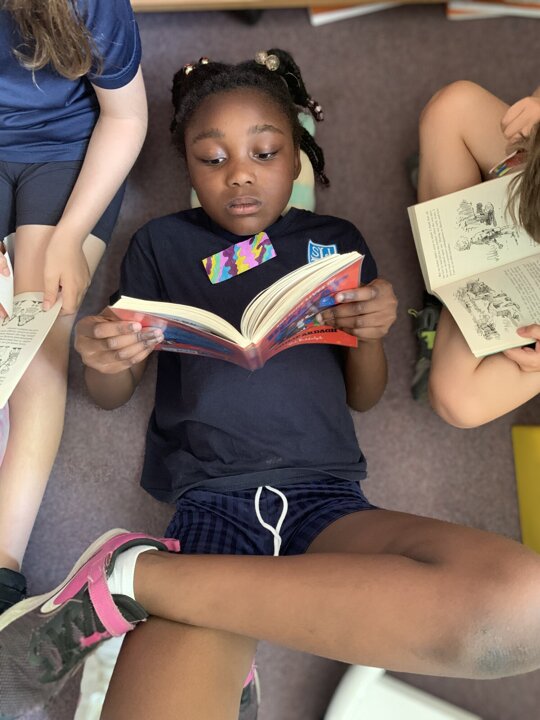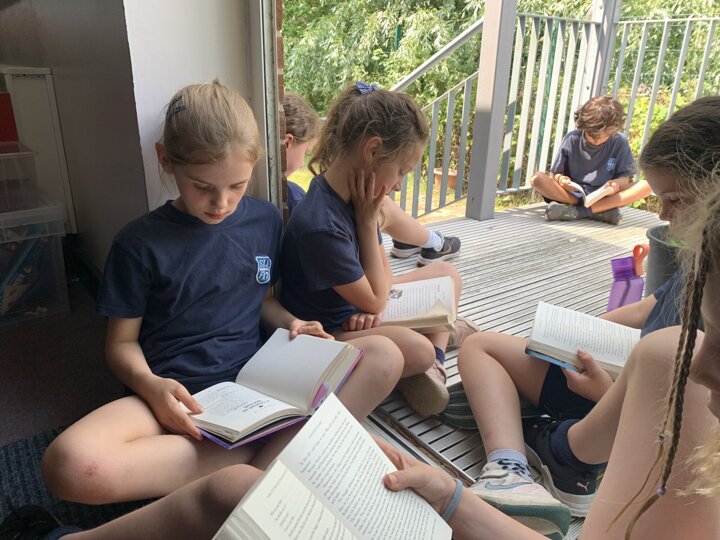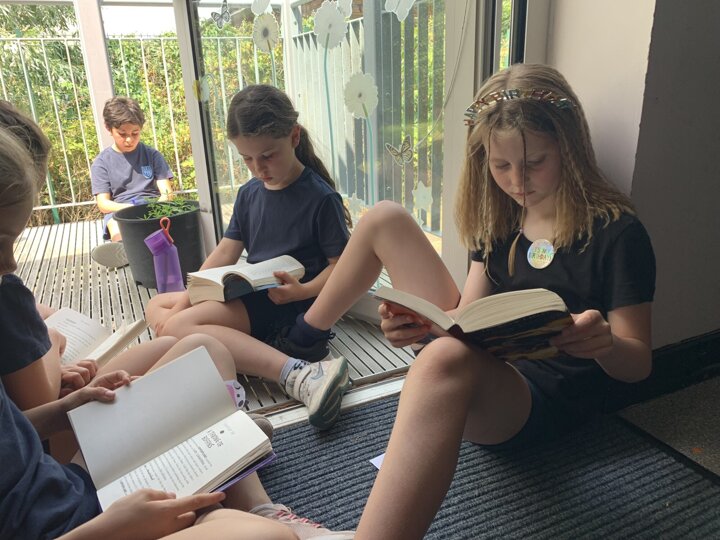English
At St John Fisher we believe that a quality English curriculum should develop children’s love of reading, writing and discussion. We have a rigorous and well organised English curriculum, that provides many purposeful opportunities for reading, writing and discussion. We promote the development of oracy skills across the curriculum, in all subjects and at every opportunity. These aims are embedded across our English lessons and the wider curriculum. We provide the means for children to develop a secure knowledge-base in English, which follows a clear pathway of progression as they advance through the primary curriculum. Rigorous assessment and review, ensures that we are able to provide targeted support, so that all children experience success in literacy; we believe that a secure basis in literacy skills is crucial to a high quality education and will give our children the tools they need for a lifelong love of learning.
Writing at St. John Fisher
As part of our school priorities at St. John Fisher, we aim to raise the attainment of our pupils in writing through an engaging, relevant and rich curriculum. In order to support this, we have developed a bespoke curriculum, ensuring the coverage of a wide range of fiction and non-fiction genres.
Our writing curriculum is split into three phases.
1. Explore
The ‘explore’ phase is when the children investigate the text type that they are going to learn about. In Key Stage 1, this involves mapping the text using imagery and exploring the basic structure of the text. In Key Stage 2, children analyse the structure and the grammatical features specific to the genre, ready to practice and apply this within their own writing. In both key stages, exploration and application of new and key vocabulary occurs in this phase. A toolkit for writing is produced at this time, so that children are aware of how the text genre should look and sound.
2. Practise
In this phase, the children learn about and practise key skills which are specific to writing in their genre. A range of strategies are used here, including: oral construction, shared writing, modelled writing, grammar-focussed lessons, and short burst writing, which involves practising a learnt skill over a short piece of writing.
3. Write
This phase is when the children are expected to plan and write their own piece, applying the relevant knowledge and skills for the text type. They consider what the text type should look like and sound like, applying what they have learned in the ‘explore’ and ‘practise’ phases. The toolkit, constructed in the ‘explore’ phase provides targets for the children to attend to throughout their piece of writing. This is followed by an opportunity for the children to edit their work, in line with the toolkit and year group curriculum expectations.
Adaptive Teaching of Writing
At St. John Fisher, we believe that an inclusive writing curriculum supports all pupils to envision themselves as successful writers. Teachers employ a wide range of strategies to achieve this throughout each sequence of writing, including: pre-teaching of model texts and vocabulary; printing on dyslexia-friendly coloured paper; oral rehearsal opportunities to verbalise ideas before writing; story mapping; visual prompts e.g. widgit images and video stimuli; basing writing on real life experiences such as educational visits and experiences at home/school; colourful semantics and sentence structure focus work; word banks; assistive technology e.g. access to laptops and speech to text software; and adapted planning formats. Teachers personalise adaptations to support the needs of individual children so that they have the best opportunity to be successful writers.
Sentence Level Work
For writing to progress, children should have a good grasp of sentence structure. Children begin by identifying nouns and verbs, before using these to construct a sentence with a subject and verb (someone/something completing an action). Once children are confident in writing a sequence of simple sentences, they begin to explore compound and complex sentences. This helps learners expand simple sentences with structure and clarity. As children progress, they learn to modify sentence structure for effect e.g. by using fronted adverbials or the passive voice, allowing them to express their ideas more precisely and convey their intended meaning in their writing.
Skills within genres
Teaching children to recognise the different genres of writing, including their characteristics and purpose will help them to implement these techniques in their own writing. Throughout their schooling, children are exposed to a wide variety of non-fiction, narrative and poetry texts. Within nonfiction, they will be exposed to explanation texts to inform; non-chronological reports to explain and persuasive texts to persuade and entertain, to name a few. Within narrative texts, children will examine stories with dilemmas, traditional tales and stories in an historical setting, among others. Children also have the opportunity to explore and perform poetry.
What can you do to help?
Writing begins and ends with enjoying stories and reading books. Children who read for pleasure are more likely to succeed as writers because of the way in which reading develops language development. At St. John Fisher, we encourage all parents to read with their children every day, whatever their age or ability.
Your child may bring home a story/text map to learn from time to time as part of their home learning.


At St John Fisher we promote and encourage reading at every opportunity across the school. We believe that reading is the magical key that can unlock the door to a life long love of learning. We encourage pupils to read anywhere and everywhere! We recognise that the social environment can enhance our reading experience and we try to support this at every opportunity, adapting it to invite and encourage a love of reading.
At St John Fisher we value the importance of reading aloud to children. EYRS and KS1 have story time every day, across KS2, each class has a class novel, which they read with their class teacher during 'Reading for Pleasure'. There is considerable evidence that reading aloud to children enables them to process challenging content, text features and vocabulary – even in subjects not normally associated with reading aloud, such as science and technology (Heisley and Kukan 2010). Furthermore, reading to 4-5 year olds more frequently has been shown to lead to higher reading, maths and cognitive skills at age 8-9 (Kalb and van Ours, 2013). We also have other times during the class timetable, where the pupils have 'Reading for Pleasure', plus 'Guided Reading' sessions timetabled throughout the week. All pupils have the opportunity to take home two books a week, if they choose, their staff allocated reading book and a chosen book from the reading corner in class.
Benefits to Reading for Pleasure (DfE)
There is a growing body of evidence which illustrates the importance of reading for pleasure for both educational purposes as well as personal development (cited in Clark and Rumbold, 2006).
- Evidence suggests that there is a positive relationship between reading frequency, reading enjoyment and attainment (Clark 2011; Clark and Douglas 2011).
- Reading enjoyment has been reported as more important for children’s educational success than their family’s socio-economic status (OECD, 2002).
- There is a positive link between positive attitudes towards reading and scoring well on reading assessments (Twist et al, 2007).
- Regularly reading stories or novels outside of school is associated with higher scores in reading assessments (PIRLS, 2006; PISA, 2009).
- International evidence supports these findings; US research reports that independent reading is the best predictor of reading achievement (Anderson, Wilson and Fielding, 1988).
- Evidence suggests that reading for pleasure is an activity that has emotional and social consequences (Clark and Rumbold, 2006).
- Other benefits to reading for pleasure include: text comprehension and grammar, positive reading attitudes, pleasure in reading in later life, increased general knowledge (Clark and Rumbold, 2006).

How to support your child with reading

Phonics
At St John Fisher we follow the 'Little Wandle Letters and Sounds Revised' programme for the teaching of phonics across the school. 'Little Wandle Letters and Sounds Revised' is a phonics programme validated by the Department for Education. St John Fisher have trained all staff to effectively use these materials in the classroom. Please view the below video explaining how it works and how you can support your child further at home.
Some possible guides for parents from the 'Little Wandle Letters and Sounds Revised' programme.
For further information on the teaching of 'Little Wandle Letters and Sounds Revised' please view their parent page.
Some videos from 'Little Wandle Letters and Sounds Revised', which may support phonics at home:


